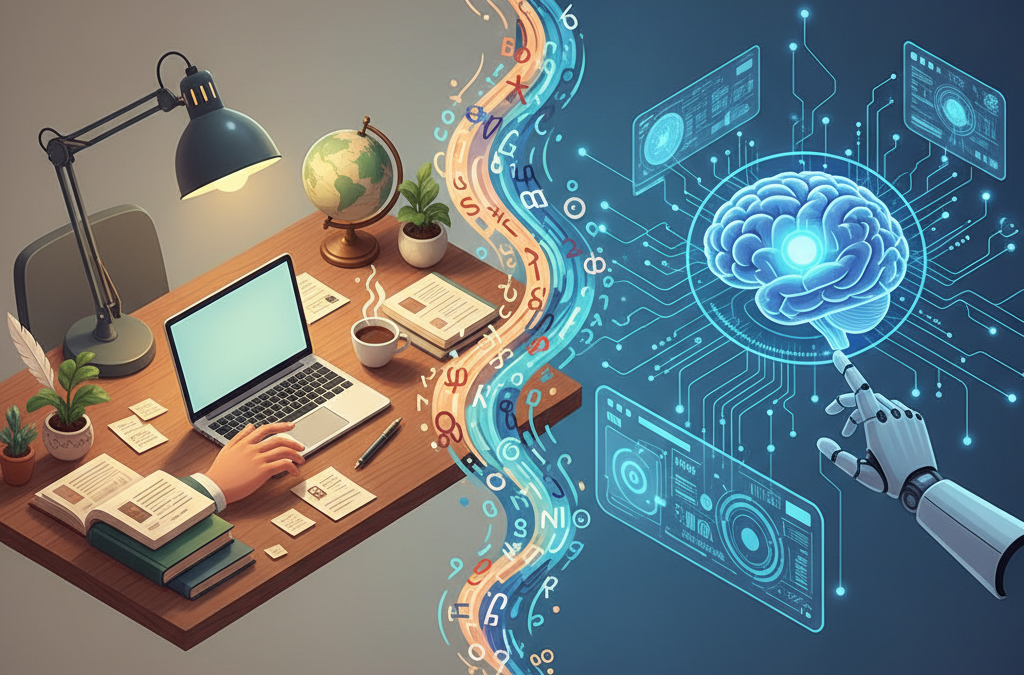The Difference Between Human Translation and Machine Translation: Which is Better?
In an increasingly interconnected world, translation has become a vital tool for effective communication across cultures and languages. With technological advancements, multiple translation options have emerged, most notably human translation and machine translation. But which one delivers better results? In this article, we examine the distinctions between human and machine translation, highlighting the advantages of each and why human translation remains indispensable in specialized fields such as law and medicine.
What is Human Translation?
Human translation is the process carried out by a professional translator with linguistic and cultural expertise to transfer texts from one language to another. Human translators rely on their deep understanding of language, context, and culture to ensure the accuracy and appropriateness of the text.
What is Machine Translation?
Machine translation relies on artificial intelligence software, such as Google Translate or DeepL, to translate texts instantly and accurately. These tools utilize advanced algorithms to analyze texts and generate translations based on extensive linguistic datasets.
Advantages of Human Translation
- Accuracy and Cultural Understanding:
Human translators grasp cultural and contextual nuances that machine tools often miss. For example, the English phrase “Break a leg” (meaning “good luck” in a theatrical context) might be translated by a machine tool as “break your leg,” leading to misunderstanding. A human translator selects the culturally appropriate expression. - Specialization in Sensitive Fields:
In fields such as law and medicine, accuracy is crucial. Translating a legal contract or medical report requires a deep understanding of specialized terminology and local regulations. Professional translators are trained to handle these complexities, while machine tools may produce vague or incorrect translations. - Adaptation to the Target Audience:
Human translators can tailor the text to suit the audience, whether using formal language for government documents or engaging marketing language for advertisements. - Error Correction and Review:
Professional translators review their work to ensure it is error-free, guaranteeing high quality and reliability in the final text.
Advantages of Machine Translation
- Speed:
Machine tools like Google Translate or DeepL provide instant translations, making them ideal for simple texts or daily conversations. - Cost:
Most machine translation tools are free or low-cost, making them an economical choice for individuals or businesses with limited budgets. - Support for Multiple Languages:
These tools support a wide range of languages, making them helpful in translating between rare languages where human translators may not be readily available.
Why Human Translation Excels in Specialized Fields
Despite technological advancements, human translation remains the optimal choice for fields requiring high accuracy and deep understanding, such as:
- Law: Incorrectly translating a legal contract or judicial document can lead to legal disputes or financial losses. Human translators ensure the use of accurate, legally compliant terminology that is consistent with local legal systems.
- Medicine: Inaccurate translation of a medical report or medication instructions can endanger patients’ lives. Translators specialized in the medical field have the necessary knowledge to avoid such errors.
- Marketing: Translating marketing materials requires creativity and adaptation to local culture to attract customers, a task that machine tools cannot effectively achieve.
For example, translating a slogan like Nike’s “Just Do It” requires selecting a powerful and inspiring expression that suits the target language, not just a literal translation.
When Can Machine Translation Be Used?
Machine translation is suitable for informal uses, such as:
- Quickly understanding general texts (e.g., articles or emails).
- Basic communication during travel or casual conversations.
- Translating short texts that do not require high accuracy.
However, it is always recommended to have machine translations reviewed by a human translator to ensure quality, primarily if the text will be used in a professional context.
Conclusion: Human Translation is the Best Choice for Quality
While machine translation offers a quick and cost-effective solution, it cannot match the accuracy, cultural understanding, and specialized expertise of human translation. In sensitive fields like law, medicine, or marketing, professional translators deliver reliable results that protect your interests and enhance your communication.
If you’re looking for professional translation services that guarantee quality and accuracy, relying on a certified translation agency is the smartest choice. Contact us today to receive translations that meet your needs to the highest standards of quality.

